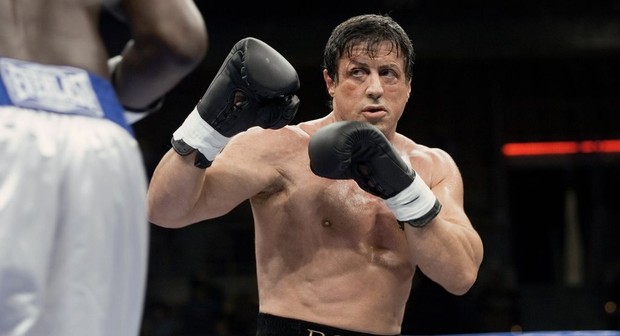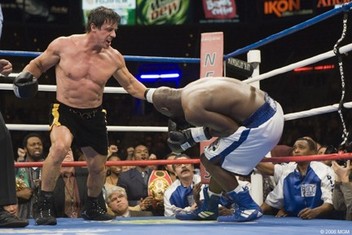Rocky Balboa (2006)
“Rocky Balboa” (2006), written, directed by, and starring Sylvester Stallone, serves as the heartfelt sixth installment in the Rocky franchise. More than just a boxing movie, it is a powerful reflection on aging, loss, and resilience, portraying the enduring spirit of a man who refuses to be defeated by time or circumstance.
The film opens decades after the events of Rocky V. Rocky Balboa, now in his late fifties, lives a quiet life in Philadelphia. His beloved wife, Adrian, has passed away from cancer, leaving a void that Rocky still struggles to fill. He spends much of his time visiting her grave, reminiscing about their past, and running Adrian’s Restaurant, named in her honor. There, he entertains diners with stories from his boxing days while maintaining a humble, lonely existence.

Rocky’s relationship with his son, Robert Balboa Jr. (Milo Ventimiglia), is strained. Robert works in the corporate world and feels overshadowed by his father’s legendary reputation, avoiding him out of resentment and embarrassment. Despite this emotional distance, Rocky remains loving and patient, hoping to reconnect with his son someday.
Meanwhile, the boxing world is buzzing with talk about Mason “The Line” Dixon (Antonio Tarver), the reigning heavyweight champion. Although undefeated, Dixon’s reputation suffers because fans believe he has never faced a truly challenging opponent. In an ESPN computer simulation — a fantasy fight between Dixon and Rocky in his prime — the program predicts Rocky would win. The simulation sparks national curiosity and fuels discussions about whether the old champ still has what it takes to step back into the ring.

Encouraged by nostalgia and a lingering sense of unfulfilled purpose, Rocky applies for a boxing license, planning to fight in small, local bouts. However, Dixon’s promoters see an opportunity for publicity and propose an exhibition match between Dixon and Balboa — the aging underdog versus the young champion. Initially hesitant, Rocky eventually accepts, not to prove he’s better, but to show that “it ain’t over ‘til it’s over.”
Training once again with his old friend Duke (Tony Burton), Rocky undergoes a grueling physical and emotional preparation. His body may be slower and weaker, but his heart remains unbreakable. He also finds companionship in Marie (Geraldine Hughes), a woman he befriended years earlier, and her son, who help him rediscover joy and purpose.
The climactic fight in Las Vegas is brutal and inspiring. Dixon underestimates Rocky’s endurance, and though Rocky is battered, he refuses to give up. Round after round, he proves that courage and determination matter more than age or fame. In the end, Dixon narrowly wins by split decision, but the crowd cheers for Rocky — recognizing his indomitable spirit.
As Rocky leaves the arena, he raises his fist one last time in triumph, whispering to Adrian’s memory, “Yo, Adrian, we did it.”
“Rocky Balboa” is more than a comeback story — it’s a meditation on loss, legacy, and the human will to keep fighting even when the odds seem insurmountable. With sincerity, grit, and emotional depth, Stallone delivers one of the most poignant and inspiring films of his career, closing the Rocky saga with grace and heart.



